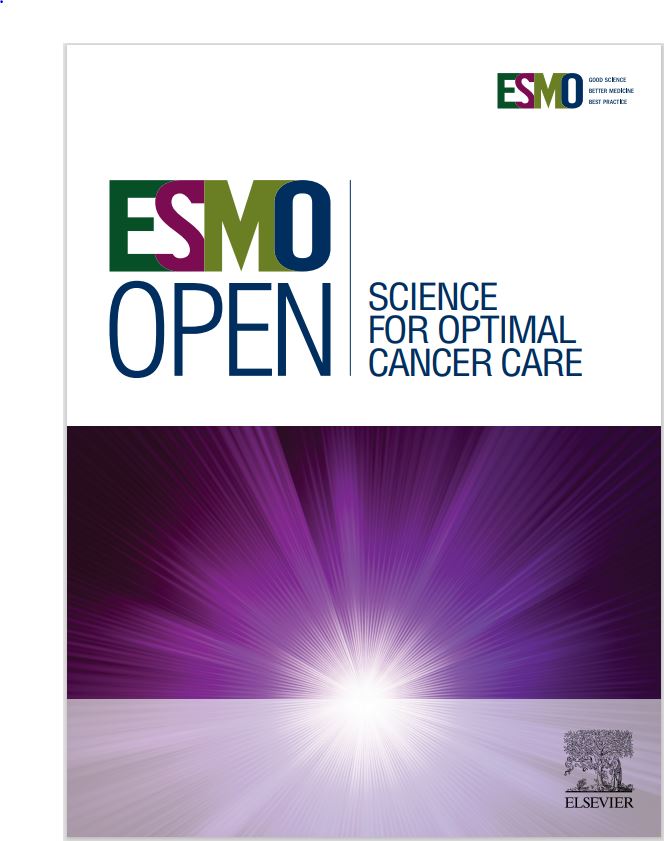Managing relapses during or after adjuvant CDK4/6 inhibitors in HR-positive/HER2-negative early breast cancer: an emerging challenge
IF 8.3
2区 医学
Q1 ONCOLOGY
引用次数: 0
Abstract
Cyclin-dependent kinase 4 and 6 inhibitors (CDK4/6i), such as abemaciclib and ribociclib, have recently been incorporated as adjuvant strategy in combination with endocrine therapy (ET) for patients with hormone receptor-positive, human epidermal growth factor receptor 2-negative early breast cancer at higher risk of recurrence. However, despite a significant reduction in recurrence rates, a subset of patients still experiences distant metastatic spreading, with nearly 10% recurring during or shortly after adjuvant CDK4/6i completion, as observed in pivotal trials. To date, only one small retrospective study has described this emerging population while ongoing trials are not specifically addressing this scenario, leaving both the efficacy of postrelapse treatments and the biological background largely unknown. As adjuvant CDK4/6i use expands, these patients with resistant disease pose a novel clinical challenge. Therefore, we propose a pragmatic approach for the management and treatment of relapses occurring during or after adjuvant CDK4/6i exposure, also highlighting key unanswered questions, future perspectives and the urgent need for dedicated research efforts.
在hr阳性/ her2阴性的早期乳腺癌中,CDK4/6抑制剂治疗期间或之后的复发管理:一个新的挑战
细胞周期蛋白依赖性激酶4和6抑制剂(CDK4/6i),如abemaciclib和ribociclib,最近已被纳入辅助策略,与内分泌治疗(ET)联合治疗激素受体阳性,人表皮生长因子受体2阴性的早期乳腺癌复发风险较高的患者。然而,尽管复发率显著降低,但在关键试验中观察到,一小部分患者仍然经历远处转移性扩散,近10%的患者在辅助CDK4/6i完成期间或完成后不久复发。迄今为止,只有一项小型回顾性研究描述了这一新兴人群,而正在进行的试验并没有专门针对这一情况,因此复发后治疗的疗效和生物学背景在很大程度上都是未知的。随着CDK4/6i佐剂使用的扩大,这些耐药疾病患者提出了新的临床挑战。因此,我们提出了一种实用的方法来管理和治疗辅助CDK4/6i暴露期间或之后发生的复发,同时也强调了关键的未解问题,未来的前景和迫切需要专门的研究工作。
本文章由计算机程序翻译,如有差异,请以英文原文为准。
求助全文
约1分钟内获得全文
求助全文
来源期刊

ESMO Open
Medicine-Oncology
CiteScore
11.70
自引率
2.70%
发文量
255
审稿时长
10 weeks
期刊介绍:
ESMO Open is the online-only, open access journal of the European Society for Medical Oncology (ESMO). It is a peer-reviewed publication dedicated to sharing high-quality medical research and educational materials from various fields of oncology. The journal specifically focuses on showcasing innovative clinical and translational cancer research.
ESMO Open aims to publish a wide range of research articles covering all aspects of oncology, including experimental studies, translational research, diagnostic advancements, and therapeutic approaches. The content of the journal includes original research articles, insightful reviews, thought-provoking editorials, and correspondence. Moreover, the journal warmly welcomes the submission of phase I trials and meta-analyses. It also showcases reviews from significant ESMO conferences and meetings, as well as publishes important position statements on behalf of ESMO.
Overall, ESMO Open offers a platform for scientists, clinicians, and researchers in the field of oncology to share their valuable insights and contribute to advancing the understanding and treatment of cancer. The journal serves as a source of up-to-date information and fosters collaboration within the oncology community.
 求助内容:
求助内容: 应助结果提醒方式:
应助结果提醒方式:


